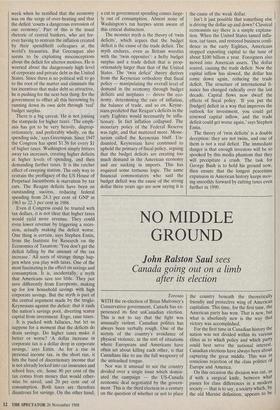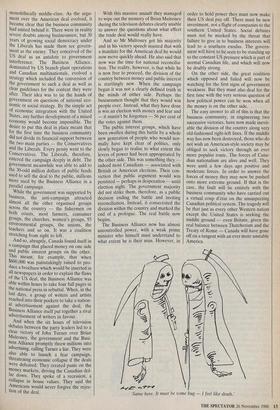NO MIDDLE GROUND
John Ralston Saul sees
Canada going out on a limb after its election
Toronto WITH the re-election of Brian Mulroney's Conservative government, Canada has ex- perienced its first unCanadian election. This is not to say that the fight was unusually violent. Canadian politics has always been verbally rough. One of the secrets of the country's avoidance of physical violence, in the sort of situations where Europeans and Americans have often set about killing each other, is that Canadians like to use the full weaponry of the unleashed tongue.
Nor was it unusual to see the country divided over a single issue which domin- ated the campaign — the US-Canada economic deal negotiated by the govern- ment. This is the third election in a century on the question of whether or not to place the country beneath the theoretically friendly and protective wing of American capitalism. This time, for the first time, the American party has won. That is new, but what is absolutely new is the way that victory was accomplished.
For the first time in Canadian history the nation was not divided within its various elites as to which policy and which party could best serve the national interest. Canadian elections have always been about capturing the great middle. This was in conscious rejection of the class politics of Europe and America. On this occasion the division was cut, as if with a surgical knife, between what passes for class differences in a modern society — that is to say, a society which, by the old Marxist definition, appears to be monolithically middle-class. As the argu- ment over the American deal evolved, it became clear that the business community had united behind it. There were in reality severe doubts among businessmen, but 30 years of growing social democracy under the Liberals has made them see govern- ment as the enemy. They conceived of the US deal as an antidote to government interference. The Business Alliance, dominated by US branch plant operations and Canadian multinationals, evolved a strategy which included the conversion of the government to such a deal as well as clear guidelines for the content they were after. Their idea was to tie the hands of government on questions of national eco- nomic or social strategy. By the simple act of economic integration with the United States, any further development of a mixed economy would become impossible. The desire to put this deal in place meant that for the first time the business community did not divide its financial support between the two main parties — the Conservatives and the Liberals. Every penny went to the Conservatives. The Liberals, therefore, entered the campaign deeply in debt. The government meanwhile was able to add to the 30-odd million dollars of public funds used to sell the deal to the public, millions more used by the Business Alliance in a parallel campaign. While the government was supported by business, the anti-campaign attracted almost all the other organised groups across the country — the fishermen on both coasts, most farmers, consumer
groups, the churches, women's groups, 93 environmental groups, the unions, the teachers and so on. It was a coalition stretching from right to left.
And so, abruptly, Canada found itself in a campaign that placed money on one side and public interest groups on the other. This meant, for example, that when $600,000 was painstakingly raised to pro- duce a brochure which would be inserted in all newspapers in order to explain the flaws of the US deal, the Business Alliance was able within hours to take four full pages in the national press in rebuttal. When, in the last days, a group of writers and artists reached into their pockets to take a nation- al advertisement against the deal, the Business Alliance itself put together a rival advertisement of writers in favour.
And when the six hours of television debates between the party leaders led to a clear victory of John Turner over Brian Mulroney, the government and the Busi- ness Alliance promptly threw millions into advertising, calling Turner a liar. They were also able to launch a fear campaign, threatening economic collapse if the deals were defeated. They created panic on the money markets, driving the Canadian dol- lar down. They spoke of a recession, a collapse in house values. They said the Americans would never forgive the rejec- tion of the deal. With this massive assault they managed to wipe out the memory of Brian Mulroney during the television debates clearly unable to answer the questions about what effect the trade deal would really have.
And so Mr Mulroney got his majority and in his victory speech insisted that with a mandate for the American deal he would now move quickly ahead. He also said that now was the time for national reconcilia- tion. The reality, however, is that while he is now free to proceed, the division of the country between money and public interest is startlingly new. When the campaign began it was not a clearly defined truth in the minds of either side. Perhaps the businessmen thought that they would win people over. Instead, what they have done is win an election with money and fear and — it mustn't be forgotten — 56 per cent of the votes against them.
The public interest groups, which have been swollen during this battle by a whole new generation of people who would nor- mally have kept clear of politics, only slowly began to realise to what extent the levers of power had been appropriated by the other side. This was something they indeed most Canadians -- associated with British or American elections. Their con- viction that public argument would win persisted — perhaps in desperation — until election night. The government majority did not strike them, therefore, as a public decision ending the battle and inviting reconciliation. Instead, it consecrated the division within the country and marked the end of a prologue. The real battle now begins. The Business Alliance now has almost uncontrolled power, with a weak prime minister who himself must understand to what extent he is their man. However, in order to hold power they must now make their US deal pay off. There must be new investment, not a flight of companies to the southern United States. Social debates must not be marked by the threat that failure to give in to business interests will lead to a southern exodus. The govern- ment will have to be seen to be standing up to the constant US pressure which is part of normal Canadian life, and which will now be doubly strong.
On the other side, the great coalition which opposed and failed will now be watching for the first signs of government weakness. But they must also deal for the first time with the very serious question of how political power can be won when all the money is on the other side.
The easy answer to all of this is that the business community, in engineering two successive victories, have now made inevit- able the division of the country along very old-fashioned right-left lines. If the middle way has now been destroyed, those who do not wish an American-style society may be obliged to seek victory through an ever more populist route. The forces of Cana- dian nationalism are alive and well. They were until a few days ago positive and moderate forces. In order to answer the forces of money they may now be pushed onto more extreme ground. If that is the case, the fault will lie entirely with the business community who have carried out a virtual coup d'etat on the unsuspecting Canadian political system. The tragedy will be that just as every other Western nation except the United States is seeking the middle ground — even Britain, given the real balance between Thatcherism and the Treaty of Rome — Canada will have gone off on a tangent with an ever more unstable America.
`Same here. It must be some bug — 1 feel like death.'











































































 Previous page
Previous page